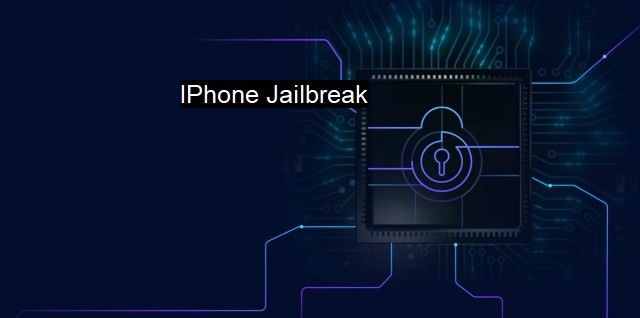What is IPhone Jailbreak?
The Risks and Rewards of iPhone Jailbreaking in the World of Cybersecurity and Antivirus
The iPhone is a worldwide popular name known for its cutting-edge technology, premium design, unmistakable quality, and above all, unrivaled security infrastructure. Coherently, Apple's remarkably rigorous approach to iPhone security has led to the emergence of a countermeasure known as 'iPhone jailbreaking.''iPhone jailbreak' is a commonly used term in the cybersecurity community which refers to the process of liberating an iPhone from its software restrictions imposed by Apple. Through jailbreaking, a device owner can unlock and modify iOS and gain access to features that Apple typically doesn't permit.
But why would someone want to jailbreak their iPhone at all? One common reason is to circumvent App Store limitations. While Apple usually vets every app before it’s made available on the App Store, some users might desire additional features that these verified apps don’t provide. Another motive for jailbreaking iPhones is to enable device customization. iPhone users might want to alter the visual interface aesthetically or technically beyond i0S's parameters. In other words, it is a way of taking control from Apple and giving it to users.
Let's take a moment to contemplate how jailbreaking works. There are several exploit tools and software available for it in the cybersecurity market. When an exploitation route is used to gain unauthorized access to an iPhone's iOS, it exposes vulnerabilities, or weak spots, in the conscience of the device's coding. Executing this correctly removes the restrictions on the iPhone, thereby liberifying other parts of the phone’s hardware and software, inviting customization opportunities.
Despite the apparent advantages presented, 'iPhone jailbreak' is frowned upon by most cybersecurity experts and professionals. The rationale behind their disapproval is both straightforward and significant- it puts user confidentiality and data at genuine risks. Jailbreaking an iPhone inherently weakens the phone's structure, exposing it to a multitude of external threats, malware, and viruses- a situation the built-in Apple security features would ordinarily shield against.
Envisage your iPhone as a fortress, with high walls, surveillance systems and tightly controlled access points that keep intruders at bay. When the iPhone is jailbroken, it would mean the walls have been demolished, the surveillance system has been turned off, and the entrance is wide open, inviting intruders to come in.
Further, upon jailbreaking an iPhone, Apple's antivirus protection commonly goes down the drain. This, coupled with external apps and software of questionable credibility, opens up an entirely new channel for virus penetration into the iPhone, consequently leading to an unstable device vulnerable to hacker attacks and illicit intrusions.
Jailbreaking can in many cases, compromise the functionality of the iPhone. Features such as Apple Pay, iMessage, and FaceTime might stop working as they ought to, not to mention the regular system updates will not be delivered from Apple, levying prolonged longevity issues on the iPhone.
On a critical note regarding business and legality, it's not illegal to jailbreak an iPhone. it does void the warranty from Apple. enterprises generally disapprove of jailbreaking due to the enhanced risk it incurs on the corporate data.
iPhone jailbreaking translates a power performance device into a vulnerability trap. While the lure of more control, customization, and 'cooler' apps might be appealing, it's worth considering the understated security risks posed. In the battle between desire and risk, remember that upholding the premium security edge of your iPhone should always prevail. The applied cybersecurity and antivirus measures by Apple exist to protect your iPhone, not limit it. Bypassing can lead to a disastrous compromise of your data privacy and device lifecycle.

IPhone Jailbreak FAQs
What is iPhone jailbreak?
iPhone jailbreak refers to the process of removing software restrictions imposed by Apple on iOS devices. This allows users to access and modify system files and install third-party apps, tweaks, and extensions that are not available in the official App Store.Is jailbreaking safe for my iPhone?
Jailbreaking may expose your iPhone to security risks and malware attacks. It can also void your device warranty and render it unstable or unusable. Therefore, it is not recommended for inexperienced users or those who rely on their iPhone for security-sensitive activities.Do I need antivirus software after jailbreaking my iPhone?
Yes, jailbreaking may weaken the security of your iPhone and increase the risk of malware infections. Therefore, it is advisable to install a reputable antivirus app that can scan for and remove malicious software from your device.Can jailbreaking my iPhone help protect my privacy?
Jailbreaking may provide additional privacy features and allow you to customize your device settings to enhance privacy. However, it can also expose your personal data and credentials to cybercriminals and compromise the security of your communications. Therefore, you should weigh the benefits and risks carefully before deciding to jailbreak your iPhone.| | A | | | B | | | C | | | D | | | E | | | F | | | G | | | H | | | I | | | J | | | K | | | L | | | M | |
| | N | | | O | | | P | | | Q | | | R | | | S | | | T | | | U | | | V | | | W | | | X | | | Y | | | Z | |
| | 1 | | | 2 | | | 3 | | | 4 | | | 7 | | | 8 | | |||||||